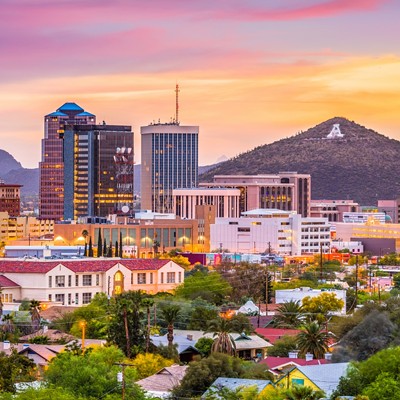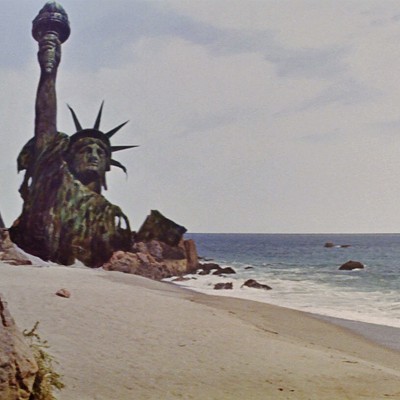"The term 'green' doesn't cut it, especially the way it is being marketed," Lancaster says as he drives back to Tucson after teaching several weeks of rainwater-harvesting workshops in New Mexico while also promoting the two volumes of Rainwater Harvesting for Drylands and Beyond. "This idea that we can buy our way green is bogus. We need to be asking ourselves: What are we trying to do, and how are we trying to live?"
Lancaster answers these questions in his books; the most recent volume focuses on how to use earthworks to harvest rainwater. A third volume is due out next year. Overall, Lancaster's books teach desert-dwellers new ways to look at conserving water, while at the same time growing food-producing gardens, using solar energy and taking advantage of gray water from the shower or washing machine.
Lancaster practices what he preaches at the home he shares with his brother Rodd and sister-in-law Chi. The house, in the Dunbar/Spring neighborhood in the shadow of downtown Tucson, is full of examples of ways that rainwater-harvesting, solar energy and gray water can enrich lives.
Lancaster has a rainwater-harvesting system that supports shade trees and other vegetation on the property, and a gray-water-harvesting system from a washing machine that goes to four different fruit trees. Lancaster and his brother run their home completely off-grid, meaning that after they installed a solar system for their home about four years ago, they stopped using the utility lines leading to the house.
The washing machine even extends the community ideals that Lancaster promotes: Use of the machine, he says, is available to friends and neighbors as long as the sun is out.
That dependence on the sun and the rain provides a deeper appreciation for nature--and when it rains, everyone comes out to celebrate.
"You shift from, 'Oh man, it's raining,' to you wanting to run outside in your underwear or bathing suit to see where the rain is going and how it is collecting," Lancaster says. "You celebrate with everyone in my neighborhood--you're not out there alone."
While there are perceptions that rainwater-harvesting is expensive due to the cost of roof-collection systems and tanks, Lancaster says that everyone can become a rainwater-harvester for the price of a shovel.
"It's not always about getting a rainwater tank," Lancaster says. "What if you started with no tank at all, (and) you instead created a bowl-shaped area to allow the land to hold the water? Instead of buying a pump, you buy low-water-use, food-producing trees, and plant them on the west and east side of your house to create a passive air conditioner, shading the house from the rising or setting sun in the summer." Lancaster says that before you know it, you can have trees producing food, creating wildlife habitat and adding beauty to the area.
Using these methods to create shade can save money and electricity: Mature trees on the east and west side of a house can reduce outside temperatures by up to 20 degrees Fahrenheit.
While getting in on the rainwater-harvesting celebration can be easy, others prefer the status quo. But science has given us a window into the future: Water is a dwindling resource, and 30 to 50 percent or more of the potable water consumed by the average single-family home in the United States goes toward irrigating landscapes.
"If, as individuals and as a community, we can conserve enough to reduce groundwater-pumping to get back in balance with the natural recharge of local water sources, then over time, we can bring our water tables back up in a regenerative, sustainable way. I do not see pumping and importing water from elsewhere, such as the distant and polluted Colorado River, as a sustainable, long-term option," Lancaster says, adding that rainwater-harvesting and gray-water systems can ease that dependence and help Tucson restore its own water table.
Such conservation can also help when a catastrophe or natural disaster occurs, he says.
"Being prepared doesn't mean you have to have a bunch of flares and firearms in your closet," Lancaster says. "It's best just to know your neighbor. When things go bad, it's most likely not going to be the government or the police (who are) there to help. Instead, it will be your neighbor who has the tool that can get you out of a heap, loan you some food and give you temporary shelter. Building community is the key thing, because it pays off right now. I know I'd much rather live in a community of friends and acquaintances than strangers."
People often question Lancaster and cast doubt about how much difference rainwater-harvesting can make living in the desert. However, he is not dissuaded.
"I hear, 'It's just a drop in the bucket,' but that's great if it's a drop in the right buckets that will create a sustainable abundance. And even if it seems like it's just you doing it, at least you'll know how to do it, and you affect other people, and more and more people will do it. That's what's happening right now," Lancaster says.
Lancaster's own schedule could be an indicator that more people are putting those drops in the right bucket. He spent most of May in New Mexico teaching permaculture and rainwater-harvesting workshops, and has additional workshops scheduled into September.
Lancaster says his books have kept him busy, but he says that for him, it isn't really about the work anymore, but about the living--using the principals he writes and teaches.
"You know the saying from Gandhi, 'Be the change you want to see in the world.' Well, I've always liked that, but I think now, it really is, 'Live the change you want (to see) in the world.' Nowadays, it's all about the living and the choices we make."













